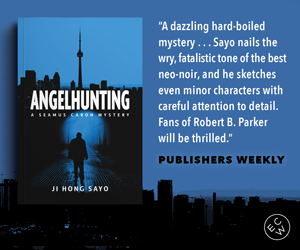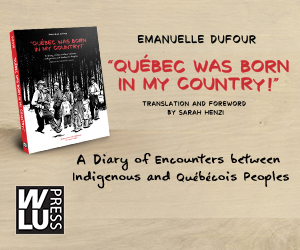"I Know Exactly What Made Me a Poet: Impatience" Grant Loveys on Being a Writing Addict, Killer Endings, and the Thunder of Yates
As its title suggests, the things, people, and situations in Newfoundland poet Grant Lovey's newest collection, Miscreations (ECW), are far from perfect. But that's precisely what makes them so fascinating.
An exploration of the broken, misprinted, clunky, and obscene, Lovey's poems conjure stark images of a defective human world which, incredibly, finds its own way to exist. Using blunt, provocative language which all-too-perfectly reflects its subject matter, Miscreations searches for beauty and wonder among the jagged ruins of everything built to fail.
We're thrilled to have Grant at Open Book today, where he discusses how a desire for a faster thrill led him to pursue poetry, why he's not a fan of fixer-upper ideas, and the next-level mysticism of the late David Berman.
Open Book:
Can you describe an experience that you believe contributed to your becoming a poet?
Grant Loveys:
I know exactly what made me a poet: impatience. For as long as I can remember, I've always wanted to write, or more accurately, I've always wanted to be a writer. Communicating on that level – transmitting what I feel in my head and heart to a stranger's head and heart using only the written word – always seemed to me to be a truly remarkable magic that allows us to transcend time and distance and even death. So when I started university and had to figure out who I was, I decided I'd finally get to be a “writer.” Very shortly after I put pen to paper for the first time, I realized I got the same thrills from the things I wrote that I received from the things I read. Then I couldn't stop. The problem was that I somehow became a kind of auto-addict fiending for the next little tingle of wonder at what was coming out of me. I soon realized that if I quit labouring over aborted novels and too-long short stories, I could get more bang for my buck, so to speak. Enter poetry, where the thrill-to-word ratio is highest. That was it. I never looked back.
OB:
What one poem – from any time period – do you wish you had been the one to write?
GL:
Maybe it's cliche at this point, but I really wish I could have Yeats's “The Second Coming” on my resume. I often think of my poems as suggestions – I'm proposing ideas to the reader, and often to myself, waiting to hear a response. They don't feel definitive to me, and that's exactly how I want them. But “The Second Coming” could be a speech from the mouth of some giant god perched at the top of the world. Yeats doesn't just speak – he thunders.
OB:
Do you write poems individually and begin assembling collections from stand-alone pieces, or do you write with a view to putting together a collection from the beginning?
GL:
I think it'd be really exciting to identify a concept and write a collection around that, but that's not how I work. It took a while, but I now understand that for me poems come when they come, on their own terms, and I have to grab them then and there and get them out of me at that moment. They won't wait, they say whatever they want to say, and I can't make them come around. I can't force them. But it's interesting: both Miscreations and my last collection came together after I spent some time with poems I'd written over a period of time and realized that I had been largely writing about certain concepts without ever realizing it. So, it seems the poems had a plan all along.
Your CanLit News
Subscribe to Open Book’s newsletter to get local book events, literary content, writing tips, and more in your inbox
OB:
What do you do with a poem that just isn't working?
GL:
I look at it like this: if it ain't broke, don't fix it, but if it is broke, I ain't fixing it. Almost everything I do is more or less worked out in my head before it ever gets written down, so if it's not feeling right in there it's not ever making it to the page. When I do write something down, it'll change somewhat in the transcription simply because the physical act of writing often tends to move things in unexpected directions, but once it's finally on the page I'll know if it works or not. If it works, great. If not, oh well. I'm not torturing it. On to the next one. That's not to say I haven't come back to one that didn't work months later and looted its corpse, because I have. Just not that often.
OB:
What's more important in your opinion: the way a poem opens or the way it ends?
GL:
There's something great about an opening line or image that hooks you, but I have to say I live for a stunning ending. There're few things more disappointing than being hooked by a strong opening line and watching the poem just kind of…fizzle. The journey is great, but I'm all about the destination. My favourite poems build and swell and grow and then smash down on me, smothering me with the unforgiving weight of a perfect final line or image that will be with me forever.
OB:
What was the last book of poetry you read that really knocked your socks off?
GL:
The collection that knocked not only my socks off, but also blew my hat, clothes, skin and hair off, too is Actual Air by the recently departed David Berman, known mostly for his songwriting with Silver Jews. It is now, and always will be, the most important book of poetry in my life, simply because I can open it at any moment, to any page, read any line, and just shake my head in sheer wonder. The man, who sadly was as troubled as they come, simply did not observe the world in a normal way. It's like he scraped away the rind of life and love and nature and people and offered us a glimpse at the flesh inside. His poem, “The Charm of 5:30”, is truly, without exaggeration, a masterpiece. He is missed.
________________________________________________________________________________________________________________
Grant Loveys’s Our Gleaming Bones Unrobed was The Globe and Mail Readers’ Pick for the best poetry collection of 2012. He lives in Mount Pearl, Newfoundland and Labrador.




